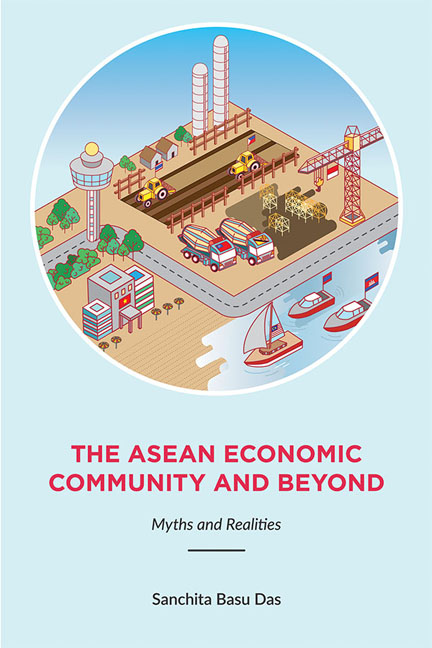Book contents
- Frontmatter
- Dedication
- Contents
- Foreword
- Acknowledgements
- Abbreviations
- 1 Introduction: The ASEAN Economic Community and Beyond
- I THE ASEAN ECONOMIC COMMUNITY (AEC)
- II BEYOND THE ASEAN ECONOMIC COMMUNITY
- 9 The Regional Comprehensive Economic Partnership: Going Beyond ASEAN+1 FTAs
- 10 Comparing ASEAN+1 FTAs for an Effective RCEP
- 11 Challenges in Negotiating the Regional Comprehensive Economic Partnership Agreement
- 12 The Next Decade in ASEAN-U.S. Economic Relations
- 13 RCEP and TPP: Comparisons and Concerns
- 14 The Trans-Pacific Partnership (TPP): Economic and Strategic Implications for the Asia-Pacific
- 15 The Trans-Pacific Partnership as a Tool to Contain China: Myth or Reality?
- 16 RCEP and TPP: Can They Converge into an FTAAP?
- 17 Is APEC's Relevance Fading?
- III AN ASEAN PERSPECTIVE OF REGIONAL CONNECTIVITY
- Appendix: Summary of the Trans-pacific Partnership Agreement
- Index
- About the Author
17 - Is APEC's Relevance Fading?
from II - BEYOND THE ASEAN ECONOMIC COMMUNITY
Published online by Cambridge University Press: 19 May 2017
- Frontmatter
- Dedication
- Contents
- Foreword
- Acknowledgements
- Abbreviations
- 1 Introduction: The ASEAN Economic Community and Beyond
- I THE ASEAN ECONOMIC COMMUNITY (AEC)
- II BEYOND THE ASEAN ECONOMIC COMMUNITY
- 9 The Regional Comprehensive Economic Partnership: Going Beyond ASEAN+1 FTAs
- 10 Comparing ASEAN+1 FTAs for an Effective RCEP
- 11 Challenges in Negotiating the Regional Comprehensive Economic Partnership Agreement
- 12 The Next Decade in ASEAN-U.S. Economic Relations
- 13 RCEP and TPP: Comparisons and Concerns
- 14 The Trans-Pacific Partnership (TPP): Economic and Strategic Implications for the Asia-Pacific
- 15 The Trans-Pacific Partnership as a Tool to Contain China: Myth or Reality?
- 16 RCEP and TPP: Can They Converge into an FTAAP?
- 17 Is APEC's Relevance Fading?
- III AN ASEAN PERSPECTIVE OF REGIONAL CONNECTIVITY
- Appendix: Summary of the Trans-pacific Partnership Agreement
- Index
- About the Author
Summary
APEC faces both internal and external challenges to its relevance in the Asia-Pacific regional architecture. Its internal challenges arise from conditions such as slow progress in regional integration; diverse membership; soft institutional structure and lack of focused and concrete agendas. Externally, it faces competition from other vehicles for regional economic cooperation like the ASEAN Economic Community (AEC), the ASEAN+1 Free Trade Agreements (FTAs), the Regional Comprehensive Economic Partnership (RCEP) and the Trans-Pacific Partnership (TPP). Since APEC and TPP are both trans-pacific arrangements, it is important to consider whether or not TPP is a consequence of APEC's limited integration progress. TPP certainly exhibits almost the reverse of APEC's weaknesses. However, APEC's relevance is not expected to fade. There are several political economy reasons for this. APEC has several achievements such as the lowering of tariff in multiple sectors and its work on trade and investment facilitation. While TPP can address the next generation of trade issues, APEC will continue with its more accommodating approach of trade and investment liberalization. From the United States’ perspective, APEC will continue to be a key economic forum where the leaders of the United States and China can meet on an annual basis. What APEC needs to address are the challenges arising out of diverse membership. It has to minimize conflicts among member economies, work on its soft institutional structure, and redefine its relevance for the future regional economic architecture. It should identify its “niche” and continue with business, trade and investment facilitation to generate concrete “deliverables”.
INTRODUCTION
The Asia-Pacific Economic Cooperation (APEC) has been a useful platform for bilateral and multilateral meetings of regional leaders since 1989. But with a growing number of regional integration measures in the Asia-Pacific like the ASEAN Economic Community (AEC), the ASEAN+1 Free Trade Agreements (FTAs), the Regional Comprehensive Economic Partnership (RCEP) and the Trans-Pacific Partnership (TPP), there are concerns about APEC's relevance as a way towards deeper economic integration in the region. This is more so, as with developments in TPP, it is increasingly felt that the TPP has replaced the APEC as a trans-Pacific arrangements, and the former is a consequence of latter's limited progress in integration.
- Type
- Chapter
- Information
- The ASEAN Economic Community and BeyondMyths and Realities, pp. 176 - 184Publisher: ISEAS–Yusof Ishak InstitutePrint publication year: 2015

